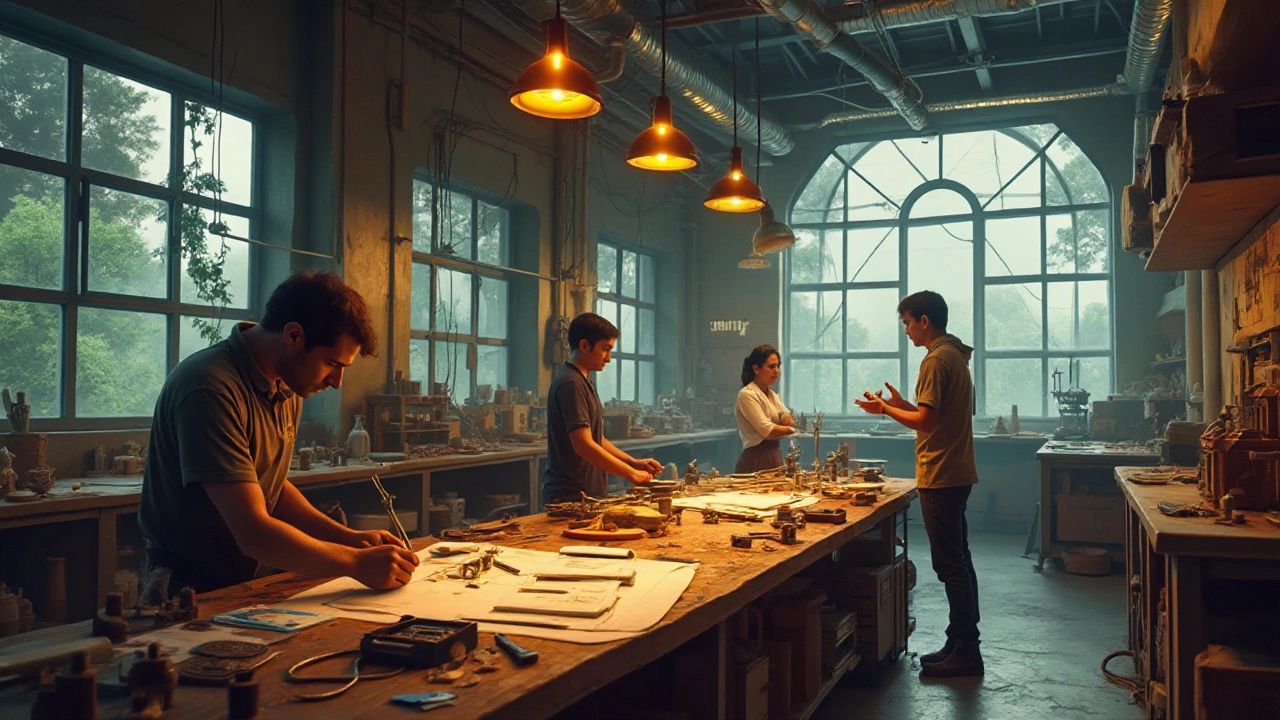Understanding what humans buy the most unlocks a wealth of opportunities for anyone looking to dive into the world of manufacturing startups. Buying habits reveal not just necessities but also desires, hopes, and even ambitions. The path to entrepreneurial success often starts with recognizing these patterns and catering to them with innovative products.
Daily essentials consistently top the list - think groceries, hygiene products, and basic clothing items. Our lives revolve around these necessities, and they offer a steady market for any budding manufacturer. Meanwhile, the digital world has taken consumerism to new heights, with gadgets and tech accessories becoming staples in almost every household.
Fashion and personal care items also rank high in consumer purchases. The constant evolution of fashion trends presents both challenges and opportunities for startups aiming to capture the attention of a fashion-conscious audience.
Emerging trends often point us towards the future of consumer habits. From sustainable products to tech-driven conveniences, keeping a finger on the pulse of these trends can place a startup at the forefront of market innovation.
With the right approach, understanding and responding to consumer purchasing trends can turn a simple idea into a thriving business venture.
- Recognizing Consumer Needs
- The Daily Essentials
- Digital Products and Gadgets
- Fashion and Personal Care
- Emerging Trends and Opportunities
Recognizing Consumer Needs
To truly succeed in manufacturing, one must delve into the psyche of the buyer. Understanding consumer needs is akin to unraveling a complex tapestry of desires, behaviors, and cultural influences that drive purchasing decisions. Everything from a consumer's daily routine to their aspirations impacts what they choose to buy. The savvy entrepreneur tunes into these signals, unearthing insights that can guide product development and marketing strategies.
The first step is recognizing the essentials that every household relies on. Groceries, cleaning supplies, OTC medications—these are constant fixtures in shopping lists worldwide. Despite economic fluctuations, these essential items remain stable because they fulfill basic needs that do not waver with trends. By focusing on such products, a startup can tap into a market that offers consistent demand and opportunities for innovation.
Understanding emerging demographics is also pivotal. For instance, the rise in single-person households necessitates products catered to individual living, while aging populations might signal demand for health-related products. Catering to varied demographics requires comprehensive market research and an adaptive manufacturing process. The idea is to speak directly to a consumer's unique circumstances and fulfill a niche that larger corporations might overlook.
Technology also plays a crucial role in shaping consumer needs. The deficit between what existing technology offers and what consumers desire presents new business avenues. Whether it's through app integrations in everyday objects or leveraging AI for personalized experiences, start-ups have the chance to pioneer in areas that conventional manufacturing hasn't yet fully embraced. Interestingly, as companies strive to be more sustainable and eco-friendly, consumer interest in such products has surged.
"The greatest enemy of knowledge is not ignorance, it's the illusion of knowledge," said Stephen Hawking, reminding us that assumptions about consumer needs should be based on rigorous research.
Research shows that consumers are now inclined towards sustainability. According to a Nielsen report, nearly half of global consumers are willing to change their consumption habits to benefit the environment. This shift poses a challenge but also a remarkable opportunity for startups to integrate sustainability into their ethos and product lines, capturing the interest of an increasingly conscientious consumer base.
Ultimately, by passionately exploring and understanding these aspects, manufacturers can design not just products but lifestyles. The focus shouldn't solely be on what people consume in large quantities, but also on why they consume those products. By delving deep, manufacturing startups can create products that genuinely resonate with their audience, fulfilling needs they might not have even realized they had.
The Daily Essentials
At the heart of consumer purchasing habits lie the daily essentials, the unsung heroes of modern life. These are the products that fill shopping baskets day in and day out, forming the backbone of consumer goods. When one examines what constitutes these essentials, it becomes clear that they are not just items for survival, but often small conveniences that enrich everyday life. Groceries, for instance, hold a paramount place in this category. Items such as bread, milk, and eggs are staples that see unwavering demand across different demographics and regions. The privations of history have taught us to cherish these basics, and today's manufacturing startups can find ample opportunity by responding to these nutrients' unyielding call. Another key element of daily essentials is hygiene products. Items like soap, toothpaste, and shampoo, although seemingly mundane, play a crucial role in consumer spending. People generally prefer reputable brands when it comes to their personal care, but there is a growing trend towards organic and eco-friendly products which opens new vistas for innovative manufacturers.
Clothing is yet another sector of the daily essentials that uncovers a world of complexity and opportunity. It's not merely about the apparel itself, but about meeting the expectations of functionality and comfort. The challenge lies not just in creating clothes, but in developing better materials that assure durability without sacrificing comfort. With the right strategic approach, a manufacturing startup can position itself to meet the evolving demands of the clothing sector. According to a Nielsen survey, nearly fifty percent of global shoppers are willing to pay more for products and services committed to having a positive social and environmental impact.
"There is a strong and growing group of consumers willing to pay more for sustainable brands," reported Nielsen in its Global Corporate Sustainability Report. This trend offers a promising path for startups willing to dive into ethical manufacturing processes.Often overlooked, cleaning supplies also form an integral part of daily essentials. The relationship between cleanliness and health has never been more pronounced, and consumers are increasingly aware of their product choices in this realm. The influx of eco-friendly and chemical-free options is steadily rising, demanding that manufacturers keep pace with these changes.
Understanding these daily essentials can help shape a business strategy that aligns with consumer values and expectations. By addressing core needs and spicing them with innovative touches, startups can carve out a niche in a highly competitive market. When embarking on this journey, potential manufacturers must pay heed to these constant demands and allow these insights to inform their offerings, creating a fulfilling cycle of provision and consumption that stands the test of time.

Digital Products and Gadgets
In today's rapidly evolving technological landscape, digital products and gadgets have become indispensable elements of our daily lives. These innovations have transformed the way we work, communicate, and entertain ourselves. As consumer reliance on technology increases, the market for digital products continues to expand, offering abundant opportunities for manufacturing startups. From smartphones to wearable devices, the range of gadgets that capture consumer interest is vast. Each product promises to enhance ease and efficiency in users' lives, making them attractive purchases for a wide audience. For those exploring the realm of **manufacturing startups**, tapping into the market for digital gadgets can be a game-changer.
The smartphone sector, in particular, has experienced remarkable growth. This $500 billion industry sees consumers attracted to sleek designs, powerful processing capabilities, and extensive app ecosystems. Apple, Samsung, and emerging brands like Xiaomi continuously release new models, driving both competition and innovation. Alongside smartphones, the rise of wearables, such as smartwatches and fitness trackers, resonates with consumers’ growing interest in health and connectivity. An intriguing aspect of this domain is the constant push towards integration, where digital products seamlessly connect with one another to create cohesive ecosystems. This interconnectedness offers convenience and appeal, solidifying the demand for related gadgets.
Alongside these devices, peripherals such as wireless earbuds, Bluetooth speakers, and smart home technologies are capturing consumer attention. These gadgets appeal to tech enthusiasts and mainstream users alike, embracing both function and style. The **consumer products** sector is dynamic, with each new release prompting a wave of interest. Take, for example, the surge in popularity of virtual reality headsets, with brands like Oculus defining the future of immersive entertainment. As technology becomes an ever more pivotal part of human life, it's crucial for innovators to stay abreast of trends and consumer needs.
One may wonder what drives a consumer to upgrade their device regularly. Often it’s due to a combination of factors like enhanced features, brand loyalty, and peer influence. A recent study by Statista highlighted this behavior, noting that approximately 55% of consumers consider themselves brand-loyal when purchasing new tech products. This illustrates the importance of creating connections with target audiences, ensuring your manufacturing efforts align with their desires.
"The key to succeeding in the gadget market lies in understanding user experience," states tech expert Jane Jacobs. "People don't just buy gadgets; they invest in improvements to their lifestyle." As a budding startup, focusing on user-centric innovation can be the differentiator in this competitive arena. By putting consumer experience at the forefront, manufacturers can cultivate products that not only resonate but also secure a dedicated customer base.Fashion and Personal Care
Fashion and personal care items have long been at the forefront of consumer interests, shaping not only the industry but also the very fabric of our society. In today's digital age, people are inundated with vast arrays of clothing styles and personal care products, all tailored to suit individual tastes and sensibilities. From the catwalks of Paris to the bustling streets of new entrants like Seoul, fashion and personal care continually evolve, reflecting both global trends and local traditions. Each year, billions are spent in this sector, making it a fertile ground for new entrepreneurs looking to break into manufacturing. Among consumer products, fashion inherently appeals to our innate desire for self-expression and identity, providing a canvas through which individuals can project their personality to the outside world.
The rise of fast fashion has significantly altered the landscape, speeding up the production cycle and making trendy items more accessible to the average shopper. On the other hand, a movement towards sustainable fashion has emerged as a counterbalance, emphasizing ethical production and eco-friendly materials. Consumer products in this category aren't limited to clothing; they extend to accessories like bags, shoes, and even wearable technology such as smartwatches. Personal care products, too, have experienced a transformation, with consumers increasingly demanding transparency about ingredients and ethical sourcing. The beauty industry, for instance, has embraced natural and organic products, with skincare leading the charge in consumer preference shifts.
A study by Allied Market Research revealed that the global personal care industry is expected to reach $716 billion by 2025, a testament to its ever-growing appeal. Not only do these products cater to basic hygiene needs, but they also tap into aspirations, promising users confidence and self-esteem. This growth narrative invites startups to explore niche segments within the market, such as vegan-friendly cosmetics or gender-neutral fashion lines. According to Leslie Ferraro, a prominent retail analyst,
"There's never been a better time for innovation in fashion and personal care. Consumers are more informed and demanding than ever, requiring companies to constantly adapt and innovate."The race is truly on for brands to stay relevant and capture a piece of this lucrative pie.Entrepreneurs eyeing the fashion and personal care arenas must pay close attention to branding and storytelling. Successful brands resonate with their audience—TerraCycle, for example, uniquely merges recycling with exclusive design offerings. Startups should consider modern consumer values such as inclusion and diversity, which are now pivotal in shaping buying decisions. Engaging with consumers through social media platforms has also proven effective, allowing brands to craft narratives while fostering direct communication with their audience. Startups should focus on building community and trust, ensuring their products not only meet aesthetic demands but stand as ethical choices in a crowded marketplace.
Manufacturers embarking on new startups in fashion and personal care must navigate challenges like supply chain management and compliance with global regulations. They should leverage technological advancements such as 3D knitting and virtual try-on experiences, which dramatically reduce waste and improve customer satisfaction. In such a dynamic environment, staying agile is key. The convergence of fashion and technology, often referred to as 'fashion tech', presents exciting collaborative opportunities, from smart textiles designed for comfort to ecological packaging innovations. Ultimately, with strategic planning and a keen understanding of consumer behavior, the possibilities in the fashion and personal care industry are as diverse and vibrant as the consumers it serves.

Emerging Trends and Opportunities
We live in a era where change is the only constant, and this is apparent in the way people shop and engage with products. The landscape of consumer habits is always evolving, and with these changes comes a fresh set of opportunities for aspiring entrepreneurs to capitalize on. One of the most significant trends we've seen emerge is the growing consumer demand for eco-friendly and sustainable products. As more individuals become environmentally conscious, they are scrutinizing the products they purchase and the impact these have on our planet. This has seen a rise in manufacturers who produce items made from sustainable materials or employ processes that reduce carbon footprint. Manufacturing startups in this space can find a receptive market by focusing on innovation and sustainability.
Another notable shift in purchasing behavior is the increasing reliance on online shopping and digital products. The convenience offered by digital solutions is unmatched, especially with the advent of personalized shopping experiences made possible through advanced algorithms and artificial intelligence. New software and tech developments continue to reshape how consumers interact with brands, buying everything from basic goods to luxury items through screens. Startups that tap into these digital ecosystems by creating seamless and engaging online platforms are sure to attract modern buyers. Consider the words of tech innovator Elon Musk who once said,
"Some people don't like change, but you need to embrace change if the alternative is disaster."Beyond the realms of sustainability and digitalization, personalization in product offerings cannot be overstated. Consumers today seek items that resonate with their personal experiences and preferences. This trend is profound in sectors like fashion, healthcare, and even tech gadgets. Personalized products tend to foster a deeper connection between brands and their customers, establishing loyalty and repeated engagement. From customizable fabrics in clothing to bespoke health supplements, the appetite for tailored experiences creates room for innovation.
In recent years, health and wellness products have also seen a boom, owing to increased consumer awareness regarding personal health. This is reflected in sectors such as organic foods, fitness gear, and wellness tech including wearable devices that track physical activity and vital statistics. A recent study highlighted in the consumer products sector showed that wellness-related purchases grew by over 20% annually over the past few years. This trend shows no signs of slowing down, making this an incredibly lucrative area for new businesses.
Finally, tech integration cannot be mentioned without acknowledging the viral trend of smart home devices. These products not only offer convenience and security but are now essential in modern households. The adoption of smart speakers, lighting systems, and even refrigerators has increased dramatically. This presents a manifold opportunity for manufacturers to innovate and provide competitive products in this tech-driven arena. For any entrepreneur, recognizing these evolving aspects of the consumer landscape is key. Focusing on areas where demand is rising opens doors to successful business ventures, especially in a world where staying updated is the key to not just surviving but thriving.
